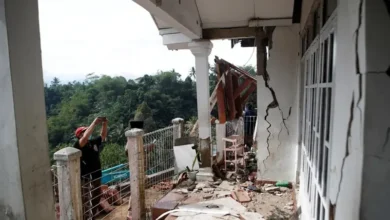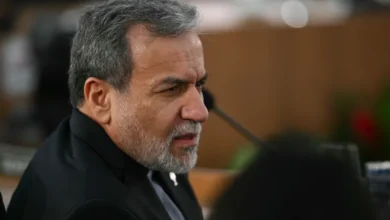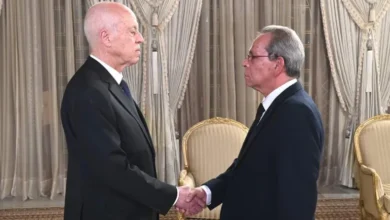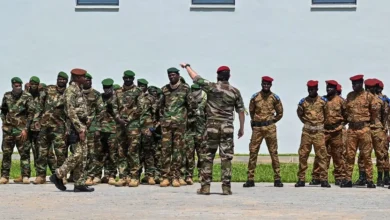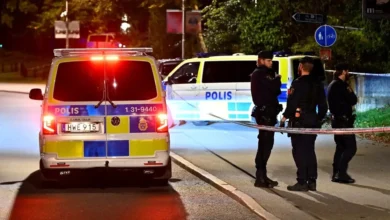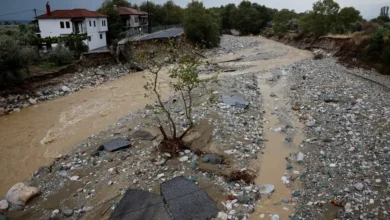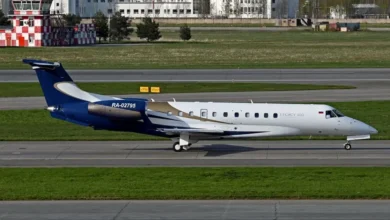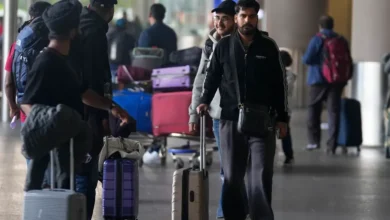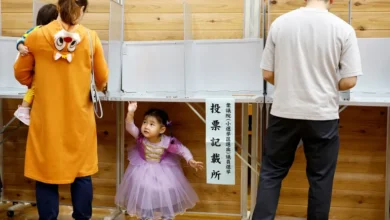A nation torn between Russia, the West: Your simple guide to Georgia’s vote
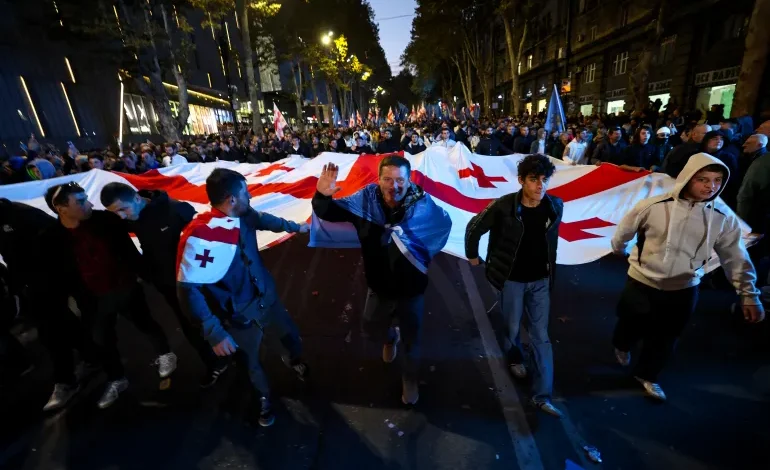
Georgians will vote in parliamentary elections on Saturday that look set to define whether the mountainous nation that straddles Eastern Europe and West Asia will pivot towards Moscow or Brussels.
The geopolitical bifurcation of the country’s politics has been gradually building for years but came to the fore in April, when wide-scale protests broke out.
They came in opposition to a controversial “foreign agents” law passed in May. Critics say it resembles Russian legislation, which has been used to crack down on dissent.
For many protesters, it also points to the Georgian Dream’s pro-Russia tilt, as the governing party seeks to secure a fourth term in power.
Pro-Western opposition parties aim to form a coalition to secure a majority government and set the country back on the path to European Union membership.Polls suggest it will be a tightly contested battle. As the Russia-Ukraine war rages on, observers have drawn parallels with recent votes in Moldova, a nation also divided between pro-Russia and pro-West factions.
They will either continue to look westwards and pursue the country’s ambition to become a full member of the EU, which is enshrined in its constitution, or turn back to Russia, a country Georgia, as a post-Soviet state, shares a long and complicated history with.
Russia and Georgia fought a five-day war in 2008 over the breakaway Abkhazia and South Ossetia regions in which several hundred people were killed and thousands of ethnic Georgians were displaced.
The conflict ended in a decisive victory for Russia after its troops swiftly reached a vital highway and camped within striking distance of Georgia’s capital, Tbilisi.
Thomas de Waal, a senior fellow with Carnegie Europe specialising in Eastern Europe and the Caucasus region, told Al Jazeera that the vote will define whether Georgia is “going to survive as a democracy” or, if Georgian Dream wins, whether it will become a one-party state like some other counties in the region, including Azerbaijan.
He cited Georgia’s Dream’s recent promise to ban the largest opposition party, the United National Movement (UNM), if it wins as a sign that Georgia could pivot more to a form of “illiberal democracy”.
What is Georgia Dream and is it pro-Russian?
Georgian Dream was established by the billionaire oligarch Bidzina Ivanishvili in 2012 and had initially been perceived as a pro-European party.
De Waal said that during the party’s first term in power, it enjoyed strong relations with Brussels, culminating in the 2014 Association Agreement that deepened economic and trade ties.
A nation torn between Russia, the West: Your simple guide to Georgia’s vote
Experts say Saturday’s elections will define where the Caucasus nation’s geopolitical future lies.

Georgians will vote in parliamentary elections on Saturday that look set to define whether the mountainous nation that straddles Eastern Europe and West Asia will pivot towards Moscow or Brussels.
The geopolitical bifurcation of the country’s politics has been gradually building for years but came to the fore in April, when wide-scale protests broke out.
Keep reading
list of 4 items
Angered by Georgia’s ‘foreign agent’ law, young protesters try new tactic
Georgia’s parliament approves law curbing LGBTQ rights
Transgender woman stabbed to death in Georgia amid LGBTQ bill controversy
Georgians rally in support of EU membership ahead of elections
end of list
They came in opposition to a controversial “foreign agents” law passed in May. Critics say it resembles Russian legislation, which has been used to crack down on dissent.
For many protesters, it also points to the Georgian Dream’s pro-Russia tilt, as the governing party seeks to secure a fourth term in power.
Pro-Western opposition parties aim to form a coalition to secure a majority government and set the country back on the path to European Union membership.
The opposition can rely on widescale support from the country’s largely western-leaning Gen Z, while Georgia Dream enjoys support among the country’s older generation and voters in rural areas.
Polls suggest it will be a tightly contested battle. As the Russia-Ukraine war rages on, observers have drawn parallels with recent votes in Moldova, a nation also divided between pro-Russia and pro-West factions.
Here is what you need to know:
What’s important about these elections?
It depends on who you ask.
“If you listen to the government, this is a choice between peace and war. [For] the opposition, this is a choice between the EU and Russia, and according to civil society, this is a choice between democracy and authoritarianism,” Kornely Kakachia, a professor and the director of the Georgian Institute of Politics, told Al Jazeera.
Experts agree that geopolitics will be a defining factor in these elections.
Voters will decide “what kind of state they want to build”, Kakachia said.

They will either continue to look westwards and pursue the country’s ambition to become a full member of the EU, which is enshrined in its constitution, or turn back to Russia, a country Georgia, as a post-Soviet state, shares a long and complicated history with.
Russia and Georgia fought a five-day war in 2008 over the breakaway Abkhazia and South Ossetia regions in which several hundred people were killed and thousands of ethnic Georgians were displaced.
The conflict ended in a decisive victory for Russia after its troops swiftly reached a vital highway and camped within striking distance of Georgia’s capital, Tbilisi.

Thomas de Waal, a senior fellow with Carnegie Europe specialising in Eastern Europe and the Caucasus region, told Al Jazeera that the vote will define whether Georgia is “going to survive as a democracy” or, if Georgian Dream wins, whether it will become a one-party state like some other counties in the region, including Azerbaijan.
He cited Georgia’s Dream’s recent promise to ban the largest opposition party, the United National Movement (UNM), if it wins as a sign that Georgia could pivot more to a form of “illiberal democracy”.
What is Georgia Dream and is it pro-Russian?
Georgian Dream was established by the billionaire oligarch Bidzina Ivanishvili in 2012 and had initially been perceived as a pro-European party.
De Waal said that during the party’s first term in power, it enjoyed strong relations with Brussels, culminating in the 2014 Association Agreement that deepened economic and trade ties.
However, in recent years, the party, particularly Ivanishvili, who made his money in Russia, has shown signs that it is moving closer to Moscow.
After Russia’s full-scale invasion of Ukraine in February 2022, Georgia’s government did not support the West’s sanctions against Moscow, and Ivanishvili has failed to publicly condemn it.
However, with about 80 percent of the population supporting EU membership, Kakachia explained that the government cannot vocally denounce the EU or any ambitions to shift away from its influence.
He said instead, the party has focused on criticising the opposition parties and Western influence for threatening to drag Georgia into the war on Ukraine.
In turn, it promotes deepening relations with Moscow to avoid antagonising its neighbour.
At the same time, he said the party signals a desire for Georgia to join the EU but on its “own terms”, which he suggests would look like Hungary’s fractious relationship with the bloc under Viktor Orban.
Does the UNM stand a chance of toppling Georgia Dream?
A nation torn between Russia, the West: Your simple guide to Georgia’s vote
Experts say Saturday’s elections will define where the Caucasus nation’s geopolitical future lies.

Georgians will vote in parliamentary elections on Saturday that look set to define whether the mountainous nation that straddles Eastern Europe and West Asia will pivot towards Moscow or Brussels.
The geopolitical bifurcation of the country’s politics has been gradually building for years but came to the fore in April, when wide-scale protests broke out.
Keep reading
list of 4 items
Angered by Georgia’s ‘foreign agent’ law, young protesters try new tactic
Georgia’s parliament approves law curbing LGBTQ rights
Transgender woman stabbed to death in Georgia amid LGBTQ bill controversy
Georgians rally in support of EU membership ahead of elections
end of list
They came in opposition to a controversial “foreign agents” law passed in May. Critics say it resembles Russian legislation, which has been used to crack down on dissent.
For many protesters, it also points to the Georgian Dream’s pro-Russia tilt, as the governing party seeks to secure a fourth term in power.
Pro-Western opposition parties aim to form a coalition to secure a majority government and set the country back on the path to European Union membership.
The opposition can rely on widescale support from the country’s largely western-leaning Gen Z, while Georgia Dream enjoys support among the country’s older generation and voters in rural areas.
Polls suggest it will be a tightly contested battle. As the Russia-Ukraine war rages on, observers have drawn parallels with recent votes in Moldova, a nation also divided between pro-Russia and pro-West factions.
Here is what you need to know:
What’s important about these elections?
It depends on who you ask.
“If you listen to the government, this is a choice between peace and war. [For] the opposition, this is a choice between the EU and Russia, and according to civil society, this is a choice between democracy and authoritarianism,” Kornely Kakachia, a professor and the director of the Georgian Institute of Politics, told Al Jazeera.
Experts agree that geopolitics will be a defining factor in these elections.
Voters will decide “what kind of state they want to build”, Kakachia said.

They will either continue to look westwards and pursue the country’s ambition to become a full member of the EU, which is enshrined in its constitution, or turn back to Russia, a country Georgia, as a post-Soviet state, shares a long and complicated history with.
Russia and Georgia fought a five-day war in 2008 over the breakaway Abkhazia and South Ossetia regions in which several hundred people were killed and thousands of ethnic Georgians were displaced.
The conflict ended in a decisive victory for Russia after its troops swiftly reached a vital highway and camped within striking distance of Georgia’s capital, Tbilisi.

Thomas de Waal, a senior fellow with Carnegie Europe specialising in Eastern Europe and the Caucasus region, told Al Jazeera that the vote will define whether Georgia is “going to survive as a democracy” or, if Georgian Dream wins, whether it will become a one-party state like some other counties in the region, including Azerbaijan.
He cited Georgia’s Dream’s recent promise to ban the largest opposition party, the United National Movement (UNM), if it wins as a sign that Georgia could pivot more to a form of “illiberal democracy”.
What is Georgia Dream and is it pro-Russian?
Georgian Dream was established by the billionaire oligarch Bidzina Ivanishvili in 2012 and had initially been perceived as a pro-European party.
De Waal said that during the party’s first term in power, it enjoyed strong relations with Brussels, culminating in the 2014 Association Agreement that deepened economic and trade ties.
However, in recent years, the party, particularly Ivanishvili, who made his money in Russia, has shown signs that it is moving closer to Moscow.
After Russia’s full-scale invasion of Ukraine in February 2022, Georgia’s government did not support the West’s sanctions against Moscow, and Ivanishvili has failed to publicly condemn it.
However, with about 80 percent of the population supporting EU membership, Kakachia explained that the government cannot vocally denounce the EU or any ambitions to shift away from its influence.
He said instead, the party has focused on criticising the opposition parties and Western influence for threatening to drag Georgia into the war on Ukraine.
In turn, it promotes deepening relations with Moscow to avoid antagonising its neighbour.
At the same time, he said the party signals a desire for Georgia to join the EU but on its “own terms”, which he suggests would look like Hungary’s fractious relationship with the bloc under Viktor Orban.
Does the UNM stand a chance of toppling Georgia Dream?
Not by itself.
Polls range from 13 percent to 20 percent for the party founded by ex-President Mikheil Saakashvili in 2003, the same year it came to power.
In its third term in power, it was mired by scandals. After wide-scale protests, it was toppled by a coalition formed by Georgian Dream in 2012.
Saakashvili was arrested in October 2021 after returning to Georgia from Ukraine and is currently serving a six-year jail sentence for “abuse of office”.
What is the Georgian Charter?
The charter is an agreement between 19 political parties to consolidate pro-European opposition to Georgian Dream.
It was introduced in May by Georgia’s current president, Salome Zourabichvili, and promises that if the opposition secures a majority, it will implement judicial and anticorruption reforms under a temporary government to put the country back on track for accession talks with the EU.
